| Jump and Rest
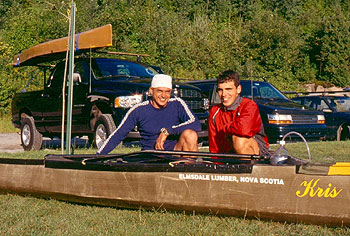 Over pasta salad and ice tea in mid June 2003, Kristoffer Archibald and Jean Marien decided to
train for and compete in the seventieth anniversary of La Classique Internationale De Canots
De La Maurice. A hundred and twenty mile canoe race running on the St. Maurice River in Quebec,
La Classique attracted seventy-three teams in 2003. The technicality and length, combined with the
massive number of spectators, make La Classique one of the best-attended and most prestigious
marathon canoe races in North America, drawing the elite of the sport.
Over pasta salad and ice tea in mid June 2003, Kristoffer Archibald and Jean Marien decided to
train for and compete in the seventieth anniversary of La Classique Internationale De Canots
De La Maurice. A hundred and twenty mile canoe race running on the St. Maurice River in Quebec,
La Classique attracted seventy-three teams in 2003. The technicality and length, combined with the
massive number of spectators, make La Classique one of the best-attended and most prestigious
marathon canoe races in North America, drawing the elite of the sport.
Everyone always says that the race is just for fun. What makes it hard then, must be how
good you are at having fun.
- Author
"It's going be just like intervals, Kris. We're going go hard for a few minutes, then a quick
rest, then we go hard, then rest...OK?"
"Yeah, all right Jean." I pant from the bow as we set out to catch back up with the pack of
canoes in front of us. We both know they have the advantage. The pack is riding wash and
exerting far less energy than we are. Already, we're probably riding or climbing some far
back wave that I've yet to learn to feel. However, because we can see the bridge, we know
that it is not far until the finish. It is time to go, whether I think I have any strength
left or not.
"Lets go Kris!"
I pull. Head slightly sunk, feet braced, concentrating on the canoes just before the bridge.
Two days before the start of La Classique International de Canots, Jean and I went for a
paddle so as to inspect some of the course and practice feeding. After we had returned,
Mom and Dad had news from Steve McAleer. Some teams were going to look at the rapids later
that evening and we could come along. Wanting to see how bad the rapids would be, we agreed,
and a few hours later were waiting on a stretch of grass beside a parking lot, below the
final barrage on the St. Maurice River. Al Rudquist - who had been animatedly describing a
portion of the power stroke which involved so much paddling on grass that the canoe moved
forward - yelled out "Charge!" and rushed to the water. Jean and I slowly followed suit as
we watched to see how different teams coped with the strong current.
The rapids proved favourable and for the most part we enjoyed a leisurely paddle downstream.
That night I had a view of a pack of canoes which suddenly burst into a sprint. The waves
sent Jean and I to the side and thus I had my view. The heavier teams seemed to be leading.
Suddenly a smaller, lighter team shot past everyone. Peter Heed talks of the ‘magic' of
making a canoe go fast. What I witnessed was undoubtedly that magic.
My water is gone. While I drink for fluid replacement, it always seems that a drink of water
helps with my wind. We are on a short rest. The boat is noisy with my breathing and Jean's
belches. The inevitable question comes from the stern:
"Are you ready?"
"Yes, lets go."
The canoe leaps forward and I concentrate on my technique. Keep the boat smooth. The pack
ahead is breaking up.
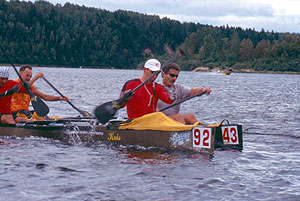 The day before the longest day of La Classique is a day of resting, waiting, concentrating,
watching, marvelling, showing off, and eating. It is the day before paddlers march down to
the St. Maurice River at La Tuque, Quebec, and line up to start the first of the one hundred
and twenty miles downstream. It is the day when one discovers how fast is fast in a marathon
pro-boat over a circular kilometre. It is a day of food preparation as fruit is cut, potatoes
boiled and drinks mixed. It is a day for bars and jells to be counted and placed with water bottles
in a cooler and handed over to the pit crew. It is the day of the sprints in which teams
competing in La Classique must sprint a kilometre and so it is also the first day for the
clocks and their accumulating time. For me, it was the beginning of my participation in a
race I have heard about as long as I can remember and the day before I view the St. Maurice
river for the first time from the start line of the most famed canoe race in North America.
It is a day of tension.
The day before the longest day of La Classique is a day of resting, waiting, concentrating,
watching, marvelling, showing off, and eating. It is the day before paddlers march down to
the St. Maurice River at La Tuque, Quebec, and line up to start the first of the one hundred
and twenty miles downstream. It is the day when one discovers how fast is fast in a marathon
pro-boat over a circular kilometre. It is a day of food preparation as fruit is cut, potatoes
boiled and drinks mixed. It is a day for bars and jells to be counted and placed with water bottles
in a cooler and handed over to the pit crew. It is the day of the sprints in which teams
competing in La Classique must sprint a kilometre and so it is also the first day for the
clocks and their accumulating time. For me, it was the beginning of my participation in a
race I have heard about as long as I can remember and the day before I view the St. Maurice
river for the first time from the start line of the most famed canoe race in North America.
It is a day of tension.
My day started early with packing and driving upriver to La Tuque while accessing feeding
areas for the pit crew. This consisted of me looking to see what a bridge looked like so
as to recognize it from the water and remembering how two years before I had served as pit
crew alongside my father for Jean Marien and Dave Lewis. In reality however, my primary concern
was staying warm under a heavy fleece jacket and pants, and hoping it would not rain in the
afternoon. Arriving in La Tuque, we made our way down to the sprint and boat measuring area.
I spent my time looking at boats and merchandise and meeting people. Time dragged even as
one canoe after another began the sprint. Finally it was time. I watched my arm extend, felt
my muscles tense and then nothing else mattered as the obnoxious blast of a horn sounded
behind. The boat surged and everything worked as my eyes levelled on the first buoy.
Then for a brief moment we fell apart as something shook Jean and I. The boat lurched.
My paddle sprang on instinct to a brace. So quick it might not have happened except that
Solomon and Real Carrier had pulled ahead just a bit on the other side of the pond.
Rounding the first buoy we were smooth again. The second buoy quickly followed, then the
third. We crossed the finish line and I began to think again. For a time the tension
left and I was just excited to watch the top teams complete the loop. But all time passes
and after a huge amount of spaghetti, later that night, the nervousness began to work
its way back into my stomach.
Some form of groan emits from my mouth. I can't go any longer. Like some form of addict
I crave the rest period.
"Not yet!" says Jean
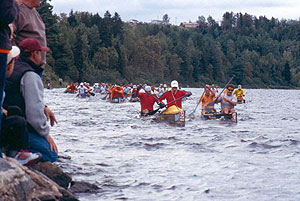 Day One. I ate breakfast out of habit, not hunger. The starting area was filled with
people. Racers rummaged in the back of vehicles and taped last minute items to their boats.
Music played from the loudspeakers and car after car continued to arrive as the thousands of
spectators wandered about. Good lucks were exchanged with people we had met forty-eight hours
before, bonded together by the same first time experience. Hands were shook of family, friends
and companions. Jean and I walked alongside our canoe and slowly made our way past the crowds
of people who lined the hill overlooking the start line. The adrenaline was beginning to seep
throughout my body and it was a relief to go for a short paddle downstream before turning
and making our way to the start line. Sitting still in the river with Jean holding the rope,
I glanced left and right and watched as seventy-five canoes lined up around me in a line
which stretched far to either side. In response to some comment another bow paddler made,
Al Rudquist, who placed himself next to us, said, "It's when that last anthem ends that you
start worrying about things". The United States anthem ended and the Canadian started.
About the half way mark, all around me, people began to reach out. Some people held their
blades in the water, other people held their paddle so that the tip slightly hovered over
the water. Everyone awaiting the start signal. The anthem ended and the siren sounded,
very faintly.
Day One. I ate breakfast out of habit, not hunger. The starting area was filled with
people. Racers rummaged in the back of vehicles and taped last minute items to their boats.
Music played from the loudspeakers and car after car continued to arrive as the thousands of
spectators wandered about. Good lucks were exchanged with people we had met forty-eight hours
before, bonded together by the same first time experience. Hands were shook of family, friends
and companions. Jean and I walked alongside our canoe and slowly made our way past the crowds
of people who lined the hill overlooking the start line. The adrenaline was beginning to seep
throughout my body and it was a relief to go for a short paddle downstream before turning
and making our way to the start line. Sitting still in the river with Jean holding the rope,
I glanced left and right and watched as seventy-five canoes lined up around me in a line
which stretched far to either side. In response to some comment another bow paddler made,
Al Rudquist, who placed himself next to us, said, "It's when that last anthem ends that you
start worrying about things". The United States anthem ended and the Canadian started.
About the half way mark, all around me, people began to reach out. Some people held their
blades in the water, other people held their paddle so that the tip slightly hovered over
the water. Everyone awaiting the start signal. The anthem ended and the siren sounded,
very faintly.
The boat went from sitting still and flat to slipping backwards down a hill. Waves tossed
us around as the wash of other boats hit us. It was my slowest start to any canoe race as
I paddled easily so as to keep my balance and relax. After a couple of hundred metres I began
to paddle harder and the tide of passing boats reversed itself as we reached the first buoy
turn. We made the turn on the inside of the pack which slowly forced us into paddling far
from shore, away from the helpful eddies of the bank. All my spring training has always been
done on rivers with half of all that training being upstream paddling and so I knew the
benefit of being close to shore. With a strong sprint, Jean and I surged ahead of the huge
pack beside and behind us and made our way to the inside bank. After making the upper buoy
turn, we set out to catch the nearest canoes. Most of the day is a blur with a few exceptions.
At a pit stop, I reached for an anti-acid and Jean decided on an Advil. Jean's sudden bout
of coughing caused one passing canoe to glance questioning at us as he managed to not choke
on the pill. After paddling alongside Solomon and Real Carriere, we tried breaking ahead only
to see them go way off to the other side of the river. I realized seconds too late that we were
entering a giant back eddy. Another time, in a short fast section of water, Solomon chose another
better line after which we never saw them again for the rest of the day. I learned to paddle
in packs and realized that sometimes, it's better to be a bit more patient. At the end I felt
cold and thought it odd that everyone should be wearing shorts. My stomach was cramped and I
felt slightly sick. We finished twenty-sixth.
"O.K" Jean gasps out.
We rest. It's been worth the output as now we sit behind another boat. The bridge is just
behind us and ahead of us is a string of boats. I'm thirsty, slightly light-headed, my sides
ache - I never knew that the lat muscle went so far down my side. My stroke increases. I try for
more strength and push myself harder as I feel Jean starting to pull. The boat ahead has
swerved slightly and it's time to go. Sometimes you only get one chance.
On the second day, we tipped.
I've been tipping in canoes since I started paddling. The first time that a good friend and
active canoeist and I got into a pro-boat was two weeks before our first race in a pro-boat.
We'd been in the boat no longer then five shaky minutes when we decided to try a buoy turn.
In the bow, my paddle slipped under the canoe as I started to draw and we were quickly upside down.
We prided ourselves on our balance and dominance in local stock races. One evening in a stock
boat, as we leisurely paddled upstream looking down on the racing shad, we tipped. In white
water, with recreational canoes, we didn't tip so much but it was still never unusual for the
canoe to be full of water on Easter weekend canoe trips. Whether it was standing waves,
improperly chosen routes, in one case a sweeper, or a leaky boat, we always ended up with
a lot of water being bailed at some point. When we managed to stay dry, it was an accomplishment.
I've tipped thirty seconds into a practice session at 7:00 AM on a dead calm river,
9:00 PM on calm lakes.
As Jean and I grew used to each other in the boat over the season, we gradually built up
confidence, each knowing that what we faced at one wavy practice session, often paled in
comparison to what we had faced a week earlier. Training on Grand Lake, we came to an
understanding with waves where only the really big ones would tip us over. Referred to
on old maps as "The Great Lake", Grand Lake lives up to its name. What makes this giant
so impressive is how it's mood shifts from mirror calm to waves that dwarf a canoe.
Once, in an attempt to do a five-hour paddle, we headed out onto Grand Lake only to encounter
large surfable waves. After surfing for a bit we tried to get past these waves in order to
put in the time needed for endurance. Time and again we tried to get past these waves only
to continually fill up with water. On our final attempt, what we'll describe forever as
a ‘wall of water' rose up before us and crashed down over my chest filling the bow with
water by ripping the front of the spray skirt from its Velcro attachments. The weight of
the water was too much and over we went. After tipping once more for reasons neither of
us could explain, we called the session off after two and a half hours and planned a
five-hour practice for the weekend.
The final paddle Jean and I did in Nova Scotia was also on Grand Lake and as luck would
have it, the lake was in a foul, or happy mood. However one chooses to look at it, the
lake was wavy. As we struggled to get back into the canoe, the waves swept us off our feet.
When we finally got in the canoe, a wave threw Jean out and as I turned around to see what
was going on, the last thing I saw before being flipped was Jean's head bobbing at the crest
of a wave.
So, less than an hour into the second day of La Classique, as three motor boat waves joined
to defeat our braces and stability, it was no new thing to have that sickening feeling of
knowing that the water was getting closer and closer. It was just that this time land was a couple
of minutes away and we knew our good start was going by us at an amazingly fast pace.
How long we struggled in the water to empty the boat and then crawl in is hard to guess
at. I know that a minute before we tipped, I was thinking that if we caught the boat
ahead of us, they might pull us up to below twentieth position and when we started to
paddle after tipping we passed people who seemed to be floating with the current. We
were mad and after exchanging some water, we began to paddle hard. Gradually, we climbed
back up, wake after wake, and always bursting away from a canoe before they could settle
comfortably on our wash. We hit the portage at Grand Mere and passed a canoe at the start
of the hill. We seemed to absorb the energy of the crowd and up the hill we fled, our load
lightened by the wind's theft of my paddle from my hands minutes before the run. Portage two
came shortly after. A twisting run through the woods ultimately placed us on Shawinagan
Bay and further closed the gap between us and the next few boats.
The windy conditions of Shawinagan Bay proved advantageous as we handled the waves with
ease, always gaining on those ahead of us. Then came the final portage of the third day;
a run down a main street in Shawinagan. After rounding the buoy, Dad's voice came into my
head: "no matter how tired you might be, when you hit that portage, you'll run". Reaching
the top of the steps, I was confronted with a wall of people blurred together into one mass
of colours by their indistinguishable yells. Jolted into action by Jean's push on the canoe
from behind, I ran. The canoe balanced flat on my shoulder and just before going back down
stairs to the water, we pushed ahead of another team. Putting in the water, we held the lead
over several close teams and finished in twenty-third position.
The canoe beside us is slipping back. I keep the stroke rate up and we pass by them. Ahead
is the next boat. Jump and rest, now repeat. We're by the next boat and we're almost to
the buoys we must round before completing the final few boat lengths. A slight swell is
lifting us up and down. Almost there...
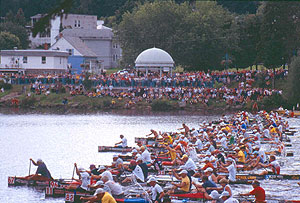 On the morning of the third day I felt horrible. I was stiff and tired. Despite walking
around, going for a short run and long stretches, I could not shake the feeling of lethargy.
In the boat, I felt weak. The start was as I had come to expect but very quickly I could feel
myself being drained of energy. After several unsuccessful attempts to pass, by this point
very familiar boats, we finally saw our opportunity in a shallow section of an inside turn.
The boat popped up and we never saw that team again until the end. Shortly after the start
was the first of the two portages. The portage went on and on with the longest part being
downhill. After getting back into the boat, I ate and tried to get back what I could of my
strength. I hungrily squeezed jell back into my throat and drank some Boost. By this time,
we had caught up to several individual canoes and a pack formed around us. I was starting
to feel good when the next dam came in sight, the final barrage. We tried to break away as
we had done so often for the past several miles. Gradually, we pulled ahead a boat
length. That was about as far as we could get by the time we reached the portage. Fumbling
in getting out, my legs shook as I pushed them to an awkward run. Mom and Dad were saying
something as they replaced the water bottles. It didn't matter as the rapids were coming,
an area we had to get to first or else we were going be dropped by those whom we'd unwillingly
pulled for over an hour.
On the morning of the third day I felt horrible. I was stiff and tired. Despite walking
around, going for a short run and long stretches, I could not shake the feeling of lethargy.
In the boat, I felt weak. The start was as I had come to expect but very quickly I could feel
myself being drained of energy. After several unsuccessful attempts to pass, by this point
very familiar boats, we finally saw our opportunity in a shallow section of an inside turn.
The boat popped up and we never saw that team again until the end. Shortly after the start
was the first of the two portages. The portage went on and on with the longest part being
downhill. After getting back into the boat, I ate and tried to get back what I could of my
strength. I hungrily squeezed jell back into my throat and drank some Boost. By this time,
we had caught up to several individual canoes and a pack formed around us. I was starting
to feel good when the next dam came in sight, the final barrage. We tried to break away as
we had done so often for the past several miles. Gradually, we pulled ahead a boat
length. That was about as far as we could get by the time we reached the portage. Fumbling
in getting out, my legs shook as I pushed them to an awkward run. Mom and Dad were saying
something as they replaced the water bottles. It didn't matter as the rapids were coming,
an area we had to get to first or else we were going be dropped by those whom we'd unwillingly
pulled for over an hour.
The rapids set us back. Inexperience in that sort of water led to nervousness, which meant
a slower pace. We stayed afloat though and chose the right route in a section of the river
that was constantly changing, as Quebec Hydro technicians decided on the duel fates of the
river and canoeists. As we entered smoother water, we began to paddle faster and watched as
the pack we had pulled in the previous reservoir, the pack that passed us in the rapids,
came into waking distance. We could see the bridge.
I transfer the post into a draw ending in a forward stroke as we round the final buoy. We
are in line with the finish and paddling hard. The canoe sinks down in suck water. Slightly
ahead of us is a boat and a wave behind us is a boat. We roll up and down with the slight St.
Lawrence swell. The boat ahead is across and with a few final strokes we finish to the
blaring voice of the announcer. I look back and see Jean grinning in reflection of my own face.
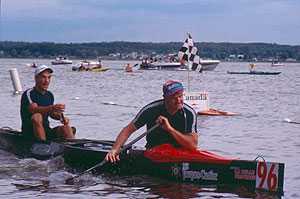 Jean is out of the boat, stomach deep in water. He shifts the boat, throwing me into an
automatic brace and triggering a laugh from both of us. Dad is wading into the water oblivious
to being soaked clapping me on the shoulder followed closely by Mom. Neither can talk loudly,
their voices horse. They grab the boat and start walking up the corridor of people. Jean and
I follow between receiving and exchanging congratulations. There is no longer any pain.
Walking up out of the water and through a throng of people, I realize that our boat has disappeared.
Jean is out of the boat, stomach deep in water. He shifts the boat, throwing me into an
automatic brace and triggering a laugh from both of us. Dad is wading into the water oblivious
to being soaked clapping me on the shoulder followed closely by Mom. Neither can talk loudly,
their voices horse. They grab the boat and start walking up the corridor of people. Jean and
I follow between receiving and exchanging congratulations. There is no longer any pain.
Walking up out of the water and through a throng of people, I realize that our boat has disappeared.
Jean is talking and laughing while introducing me to a pretty girl. She smiles slightly and
I feel myself start to laugh as I think of the spit and salt covering my face and shirt.
Absently, I notice that I've finished a water bottle Mom thrust at me and move on to a beer.
Over by the water, boats continue to finish amongst the roar of the crowds.
The twenty-fourth placement, out of seventy-three teams, would not have been possible
without the strong support of my parents Doug and Sherry Archibald and my sister
Mary-Beth, who observed far more than her share of nervous energy from everyone. A thank
you to Jean's family, specifically his son Ben and brother Andre, but also to all the other
members from Quebec whose hospitality and good nature cannot be forgotten. Finally, to
all friends in the canoeing world, for their willingness to train, teach and above all
else, share their experiences.
By Kristoffer Archibald
|